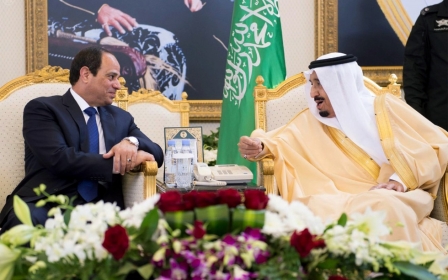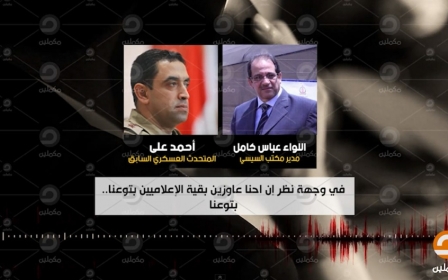Egypt's Sisi tells former PM Shafiq to stay in exile

Simmering tensions among Egypt’s ruling elite broke out into the open on Monday when former presidential candidate Ahmed Shafiq was warned by the government not to return from exile in the United Arab Emirates (UAE) and consider any future role in Egyptian politics.
Shafiq belongs to the same military political camp, which has ruled Egypt since 1952, as the current president Abdel Fattah al-Sisi. Now Sisi appears to view Shafiq as a rival who is conspiring to undermine his presidency.
Shafiq, who lost presidential elections to Mohamed Morsi in 2012, fled the country in the same year after Egypt's prosecutor-general opened an investigation into allegations of corruption when he was an official under former president Hosni Mubarak, who was toppled following the 2011 uprising.
He has remained in the UAE, despite a military coup that overthrew Morsi on 3 July 2013 and in spite of being acquitted of corruption charges in December that year, which paved the way for his return free from legal questioning.
Shafiq had cited "security reasons" for his continued residence in the UAE, despite heading a political party, the Egyptian National Movement Party, from exile.
However, Egypt's al-Shurouk broadsheet newspaper quoted on Monday a government source telling Shafiq to "forget about" playing any role in politics, and accusing him of seeking to destabilise the "legitimacy of elected president Sisi".
"The former presidential candidate is communicating with important sides, who are still backing him and continue to hope that he would have a role in politics," the source told the daily, adding that these people "are mistaken in thinking that major political changes will take place in Egypt".
Government 'message' to Shafiq's supporters
The source warned that the government is monitoring the activities of Shafiq's supporters, some of whom still work in important positions in the state, adding that the article's content is meant to serve as a "message" to them.
The source also accused Shafiq of being in contact with Egyptian businessmen, Saudi and Emirati officials, and figures in research centres in the US State Department and Pentagon – all in search of "various scenarios for the future of Egypt".
The government, according to the source, is aware of a conspiracy that involves businessmen and former security and political figures who are seeking to make changes in the political makeup in the country for their own gains.
The Egyptian newspaper also quoted a source close to Shafiq, who denied that the former presidential candidate was involved in an attempt to destabilise the current government, as "both (Sisi and Shafiq) are on the same ship and both served together in the army". He blamed instead security officials who are eager to impress Sisi by faking such reports.
Shafiq, who was Mubarak's last appointed prime minister in 2011, had served as a senior commander in the Egyptian Air Force. Sisi had been the country's head of the armed forces as well as a defence minister before running for presidency in 2014.
Meanwhile, prominent Egyptian TV anchor Amr Adib, who is a vocal supporter of Sisi, viewed the newspaper's front page splash as a serious message of warning from the government towards Shafiq's supporters.
Adib, however, did admit that he was confused about what is happening: "Weren't Shafiq's people standing by Sisi's side in the (2014 presidential) elections?" But no one in the government appears to respond.
Possible divisions?
Some analysts have reported the occurrence of divisions within Egypt's military institution.
"Some highly placed figures in the Egyptian military establishment have expressed alarm at [the worsening security situation] and have spoken of their unease to colleagues in parallel institutions outside the country," wrote David Hearst in a column for Middle East Eye.
"The conclusion drawn by those listening to them is that cracks are starting to appear in the military," he added.
Meanwhile, al-Araby al-Jadid cited on Sunday an unnamed leader in Egypt's Muslim Brotherhood, from which Morsi hails, saying that there are those in the Arab Gulf who are contemplating a role for Shafiq or Sami Annan, the former chief of staff of the Egyptian Armed Forces, in the event of Sisi's departure from power.
In the short term, however, such a scenario appears to be highly unlikely, as opposition to Sisi remains under control in Egypt, despite rising criticism from many political camps who have aided the overthrow of Morsi but have now found their freedoms squeezed in post-coup Egypt.
In addition, Gulf states have continued to send financial aid to Cairo despite signs of unease surfacing in Egyptian-Saudi ties and in spite of leaks damaging to Sisi's image in front of his Arab backers.
However, the leaks, which are suspected of being carried out by members of Egypt's security forces, and the government's confirmation that Shafiq's supporters are in important positions do reveal that unhappiness with Sisi's rule is no longer confined to those outside the powerful military institution.
New MEE newsletter: Jerusalem Dispatch
Sign up to get the latest insights and analysis on Israel-Palestine, alongside Turkey Unpacked and other MEE newsletters
Middle East Eye delivers independent and unrivalled coverage and analysis of the Middle East, North Africa and beyond. To learn more about republishing this content and the associated fees, please fill out this form. More about MEE can be found here.




